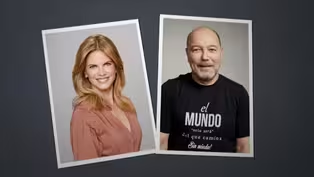Finding Your Roots
The Complex Chapter in Natalie Morales' Family History
Clip: Season 11 Episode 6 | 3m 59sVideo has Closed Captions
Natalie learns about her maternal third great grandfather, Domingos.
Natalie Morales learns about her maternal third great grandfather, Domingos, a farmer born in Brazil, a father to thirteen children. Going further back, Henry Louis Gates and researchers determine her first ancestor to come to Brazil from Portugal.
Problems playing video? | Closed Captioning Feedback
Problems playing video? | Closed Captioning Feedback
Corporate support for Season 11 of FINDING YOUR ROOTS WITH HENRY LOUIS GATES, JR. is provided by Gilead Sciences, Inc., Ancestry® and Johnson & Johnson. Major support is provided by...
Finding Your Roots
The Complex Chapter in Natalie Morales' Family History
Clip: Season 11 Episode 6 | 3m 59sVideo has Closed Captions
Natalie Morales learns about her maternal third great grandfather, Domingos, a farmer born in Brazil, a father to thirteen children. Going further back, Henry Louis Gates and researchers determine her first ancestor to come to Brazil from Portugal.
Problems playing video? | Closed Captioning Feedback
How to Watch Finding Your Roots
Finding Your Roots is available to stream on pbs.org and the free PBS App, available on iPhone, Apple TV, Android TV, Android smartphones, Amazon Fire TV, Amazon Fire Tablet, Roku, Samsung Smart TV, and Vizio.
Buy Now

Explore More Finding Your Roots
A new season of Finding Your Roots is premiering January 7th! Stream now past episodes and tune in to PBS on Tuesdays at 8/7 for all-new episodes as renowned scholar Dr. Henry Louis Gates, Jr. guides influential guests into their roots, uncovering deep secrets, hidden identities and lost ancestors.Providing Support for PBS.org
Learn Moreabout PBS online sponsorshipWe'd already traced Natalie Morales's father's roots in Puerto Rico, revealing her ties to sugar planters, soldiers, and a notable pirate.
Now turning to her maternal ancestry, we encountered another compelling character: Natalie's third great-grandfather, a man named Domingos da Silva Oliveira.
Domingos was born in Brazil around 1835.
The son of a municipal judge, but he didn't follow in his father's footsteps.
Instead, he became a farmer.
And according to his obituary, he left behind a significant legacy.
"A sectarian of liberal ideas, he enjoyed much prestige during the empire.
He had deserved political influence, but he never wanted to hold any office.
He always dedicated himself to farming.
And although he was not wealthy, he lived independently.
He had contracted three marriages, and from these three marriages, there were 13 children."
Seems like a humble person.
Yeah, who was prolific.
Prolific!
In many ways.
That means you have a zillion cousins in Brazil.
Marriage and children, yes, he was prolific, yes.
13 by three wives.
Yes, yes.
What's it like to read that?
You know, it's interesting because a lot of the traits that I read, I'm like, "That's like my mom, that's like my mom, that's like my mom," that he had upright and just character, seemed like a humble person.
While he "deserved political influence, he never wanted to hold any office," this is my mom.
She's so humble, hardworking, and just doesn't need to be recognized.
Right.
That's my mom.
Regrettably, as we look closer into Domingos's life, we saw that there was more to him than just his good qualities.
Brazil was colonized by Portugal in the early 1500s and became the center of slavery in the entire New World.
It's estimated that almost 5 million Africans arrived on its shores, and at least one of them ended up on Domingos's farm.
Another slave owner, in the family.
Another slave owner.
Oh boy.
Your third great-grandfather, Domingos was a slave owner.
Yes.
So on both sides.
What's it like to learn that?
Interesting.
He was of liberal ideas, but yet he was a slave owner, so, but, maybe everybody around him at that time maybe was in Brazil.
Who knows?
Yeah, there were- Not that there's justifying, but...
It was as common as common can be in Brazil.
Mm-hmm.
I mean, it's a sad piece of history.
It really is.
It's a sad piece of my family history, but it's a lot of people's family history unfortunately.
We now set out to see what more we could learn about this branch of Natalie's roots.
And we got very lucky .
In Glaura, a small town in south-central Brazil, we uncovered a baptismal record for Domingos's father.
It lists his parents, Natalie's fifth great-grandparents.
And we learned that his father, a man named João da Silva de Oliveira, was born in Portugal.
João is your original immigrant ancestor- From Portugal.
on this line from Portugal.
You got it!
That's incredible, wow!
He came to Brazil from Portugal sometime in the mid 1700s.
Yes.
There you have it.
That's my direct line- Yeah, and so... to Brazil.
So many people in either Puerto Rico or Brazil would never have any idea when their family came over.
Right, and who was the first.
So here he is, the first!
But you do, there he is.
What's it like to learn that?
João da Silva de Oliveira.
That's fantastic.
This is like a gold mine.
Video has Closed Captions
Preview: S11 Ep6 | 30s | Henry Louis Gates, Jr. meets musician Rubén Blades & journalist Natalie Morales. (30s)
Rubén Blades Traces His Panamanian Heritage
Video has Closed Captions
Clip: S11 Ep6 | 4m 5s | Rubén learns about the difficult life of his African ancestor in Panama on his mother's side. (4m 5s)
Providing Support for PBS.org
Learn Moreabout PBS online sponsorship

- History
Great Migrations: A People on The Move
Great Migrations explores how a series of Black migrations have shaped America.












Support for PBS provided by:









